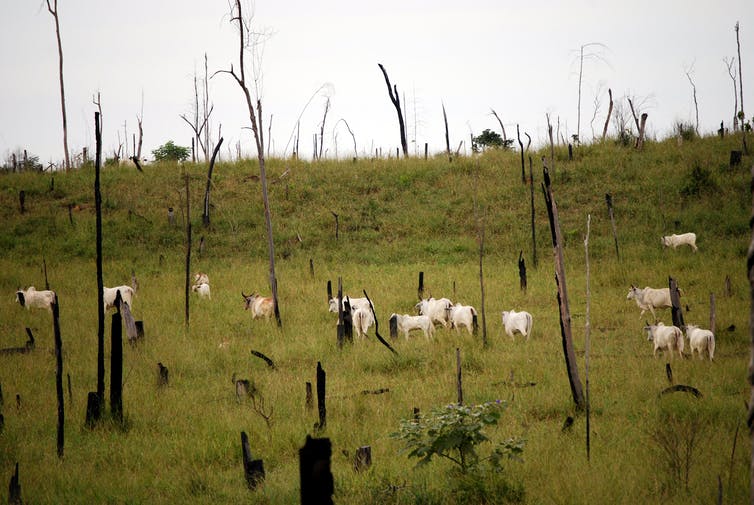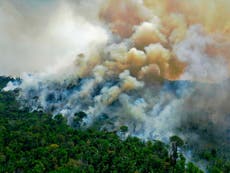Beef poses high deforestation risk thanks to ‘extremely poor’ efforts to trace supply chains, report finds
Study of world’s largest commodity companies finds almost no visibility about where cattle are bred or reared

Your support helps us to tell the story
From reproductive rights to climate change to Big Tech, The Independent is on the ground when the story is developing. Whether it's investigating the financials of Elon Musk's pro-Trump PAC or producing our latest documentary, 'The A Word', which shines a light on the American women fighting for reproductive rights, we know how important it is to parse out the facts from the messaging.
At such a critical moment in US history, we need reporters on the ground. Your donation allows us to keep sending journalists to speak to both sides of the story.
The Independent is trusted by Americans across the entire political spectrum. And unlike many other quality news outlets, we choose not to lock Americans out of our reporting and analysis with paywalls. We believe quality journalism should be available to everyone, paid for by those who can afford it.
Your support makes all the difference.Beef may pose a greater deforestation risk than other commodities such as palm oil and timber thanks to “extremely poor” efforts to trace where cattle are reared, according to a new report.
Researchers looked at the four commodities linked to 80 per cent of deforestation globally – soy, cattle, palm oil and timber – and found cattle and soy had the most opaque supply chains.
Recent commitments by world leaders to slow the rampant clearing of forests in areas such as the Amazon are unlikely to be met unless commodity producers rapidly improve their management of deforestation risks, a report by environmental non-profit CDP said.
Its analysis of the 29 largest companies which produce soy, cattle, palm oil and timber found that there is almost no visibility about where cattle are bred or reared, making it all but impossible for purchasers of beef products from some regions to ensure it is not linked to deforestation.
Timber and palm oil companies are held to higher standards for tackling deforestation than soy and cattle companies due to widespread uptake of sustainable certification.
Unlike the palm oil and timber industries, which have been forced to make supply chains more transparent after years of negative publicity, there are no existing third-party deforestation certification standards for cattle producing companies. This is despite cattle and soy being many times more land intensive than palm oil.
Soy and cattle companies’ efforts to tackle deforestation are limited to small-scale incremental initiatives providing education and financing to promote sustainable agriculture, CDP said.
While all soy companies assessed had some level of certified production, only four companies reported the total percentage certified.
A significant proportion of companies’ soy supply chains were found to me unmapped and at risk of sourcing from areas deforested areas.
Carole Ferguson, head of investor research, CDP said: “The companies assessed in this report are key suppliers to the consumer goods sector covered in our previous report. What is clear from this research is that if [consumer goods companies] are relying on this part of the supply chain to meet their net zero deforestation ambitions – a lot more work needs to be done.
“Bold and urgent action from these producers is the critical first step in tackling deforestation throughout the supply chain.”
In August, the UK’s government opened a consultation on a proposed law making it mandatory for companies to do due diligence on their supply chains and leaving them liable to fines if it isn’t up to scratch.
The draft legislation has not yet set out how large the fines will be, but the government said it will aim to make it clear that illegally produced goods “have no place in the UK market, as we build back greener from coronavirus.”
Ling Sin Fai Lam, lead analyst on CDP’s report said: “With countries like the UK looking to regulate supply chains further, the group of companies in this report will now be in the spotlight, and by addressing issues within their own supply chains, they can improve the sustainability of commodity production and tackle deforestation at the ground level.”

Join our commenting forum
Join thought-provoking conversations, follow other Independent readers and see their replies
Comments